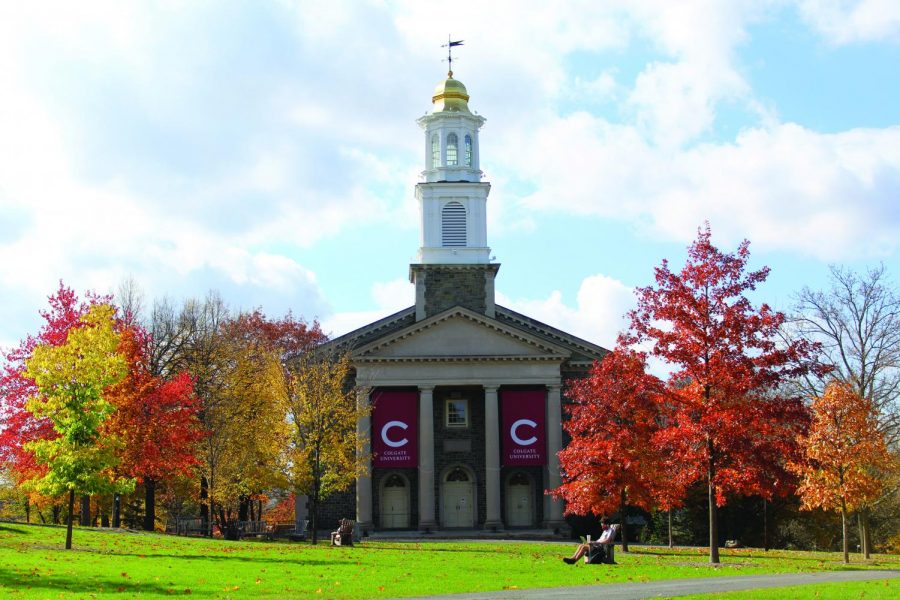Colgate Launches Graduate School Access Fund
Over the course of Fall 2020 semester, the University worked to develop a scholarship program aimed at supporting students of color and/or low-income students with demonstrated need who seek admission to graduate schools and professional schools, including those in the fields of architecture, business, engineering, law and medical.
Established through donors Giovanni Cutaia ’94 and Maree Cutaia, The Office of Career Services, in collaboration with the Provost and Dean of the Faculty Office and the Office of National Fellowships and Scholarships, launched the Graduate School Access Fund earlier this semester. A pool of qualified candidates submitted their applications on Nov. 24 and currently await notice regarding their status as potential recipients. The Fund is engineered to limit the financial barrier to entry that often restricts low-income students and students of color from applying to Graduate Programs by reducing financial barriers related to the application and selection process.
Applicants fall into one of two categories: Students actively submitting graduate or professional school applications in the current year’s admission cycle, and students preparing for and completing standardized testing this year in anticipation of applying to graduate school in the future. All students given access to the fund may request a grant of up to $1700 (or $2700 for pre-med students) related to the expenses of enrolling in test-prep courses or purchasing test-prep materials, and testing fees. They can also request an additional grant of up to $1000 to cover the costs of submitting graduate/professional school applications. For students whose application process requires some form of travel, additional travel grants of up to $500 will be available once travel restrictions due to COVID-19 are lifted.
Vice President for Career Initiatives Teresa Olsen, who was involved in overseeing and organizing the development of the Access Fund, largely accredited the success of the launch to the strength of the Colgate alumni network.
“Our alumni contribute their time, wisdom and financial support to edify many of the University’s initiatives. In this case, the Giovanni family worked directly with the President’s Office to designate their gift to initiatives that would have a strong impact on students of color and low-income students,” Olsen said.
The main objective of the access fund is to help combat the systemic underrepresentation of low-income students and students of color within applicant pools for graduate and professional school, and the subsequent underrepresentation of those students within the industries where a graduate degree is imperative, according to Olsen.
“There are many historical, social and structural root causes that create this lack of inclusion and equity. Although we can’t have a direct impact on many of these factors, we hope this support will actively help increase accessibility for our students to the graduate school pathways to which they aspire,” Olsen said.
Within the current pool of applicants for the access fund, several students expressed their appreciation for this opportunity, especially given the exacerbated social and economic hardships this year has inflicted on low-income students during the pandemic. One applicant offered their thoughts on the initiative, suggesting that there is potential for the graduate fund to positively impact low-income students and students of color on and off Colgate’s campus.
“Colgate’s decision to create this opportunity has shown that Colgate supports equal education even after college graduation … If the access fund becomes an annual event for students, in the long run, it will contribute to the growth/development of the student of color community and the low-income student community as a whole,” the applicant said.
Junior Sahil Lalwani, an international student from India, expressed his gratitude for this opportunity, which has encouraged him to fulfill his career objective of pursuing a Ph.D. in Economics. While Sahil acknowledges that this is a great start on behalf of the University to support people of color and low-income students in their journeys to graduate school, there is still a great deal of work to be done in the effort to increase pre-professional programming for those students.
“The University should play a prominent role in encouraging such opportunities for international students. Institutionally, Colgate can benefit a lot from creating increased and targeted pre-professional opportunities (preparation for graduate school, exploring careers, Masters’ options etc.) for international students,” Lalwani said.
Teresa Olsen and the Career Services Team that spearheaded the effort in conjunction with the Provost and Dean of the Faculty Office expressed confidence that the greater mission behind the initiative will extend far past this present moment in Colgate’s history.
“As with any process, what we learn from this first cycle will inform this opportunity’s future iterations. It’s too early to tell what the future holds, but the core pillars of the program will persist,” Olsen said.
Erin Knox is a senior from Branford, CT concentrating in English with a minor in economics. She has previously served as a staff writer for The Maroon-News....











